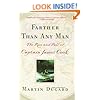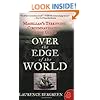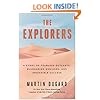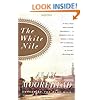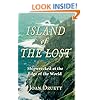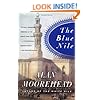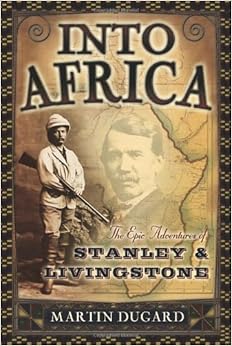
Into Africa: The Epic Adventures of Stanley and Livingstone
and over one million other books are available for Amazon Kindle. Learn more


Flip to back
Flip to front

Into Africa: The Epic Adventures of Stanley and Livingstone Paperback – April 13, 2004
See all 13 formats and editions
Hide other formats and editions
| Amazon Price | New from | Used from |
|
Audio CD, Abridged, Audiobook
"Please retry"
|
—
|
$175.76 | $34.95 |

$11.33
FREE Shipping on orders over $35.
Only 6 left in stock (more on the way).
Ships from and sold by Amazon.com.
Gift-wrap available.
NO_CONTENT_IN_FEATURE
Start reading Into Africa: The Epic Adventures of Stanley and Livingstone on your Kindle in under a minute.
Don't have a Kindle? Get your Kindle here, or download a FREE Kindle Reading App.
Don't have a Kindle? Get your Kindle here, or download a FREE Kindle Reading App.
Best Books of the Month
Want to know our Editors' picks for the best books of the month? Browse Best Books of the Month, featuring our favorite new books in more than a dozen categories.
Want to know our Editors' picks for the best books of the month? Browse Best Books of the Month, featuring our favorite new books in more than a dozen categories.
Product Details
Would you like to update product info or give feedback on images?.
|
Editorial Reviews
From Publishers Weekly
It is rare when a historical narrative keeps readers up late into the night, especially when the story is as well known as Henry Morgan Stanley's search for the missionary and explorer David Livingstone. But author and adventurer Dugard, who's written a biography of Capt. James Cook among other works, makes a suspenseful tale out of journalist Stanley's successful trek through the African interior to find and rescue a stranded Livingstone. Dugan has read extensively in unpublished diaries, newspapers of the time and the archives of Britain's Royal Geographical Society; he also visited the African locations central to the story. Together these sources enable him to re-create with immediacy the astounding hardships, both natural and manmade, that Africa put in the path of the two central characters. Dugard also presents thoughtful insights into the psychology of both Stanley and Livingstone, whose respective responses to Africa could not have differed more. Stanley was bent on beating Africa with sheer force of will, matching it brutality for brutality, while Livingstone, possessed of spirituality and a preternatural absence of any fear of death, responded to the continent's harshness with patience and humility. Descriptions of the African landscape are vivid, as are the descriptions of malaria, dysentery, sleeping sickness, insect infestations, monsoons and tribal wars, all of which Stanley and Livingstone faced. More disturbing, however is Dugard's depiction of the prosperous Arab slave trade, which creates a sense of menace that often reaches Conradian intensity. This is a well-researched, always engrossing book.
Copyright 2003 Reed Business Information, Inc. --This text refers to an out of print or unavailable edition of this title.
Copyright 2003 Reed Business Information, Inc. --This text refers to an out of print or unavailable edition of this title.
From School Library Journal
Adult/High School-A superb tale of adventure, heroism, and suffering. Dugard provides essential background information between generous servings of heart-pounding excitement. The story begins in the spring of 1866 as David Livingstone was leaving Zanzibar for Mikindary to begin his search for the source of the Nile. Meanwhile, Henry Stanley, an unremarkable freelance writer, embarked on his own adventure, a journey east from Colorado that began by rafting the South Platte River. He hoped for a career as a newspaper reporter in New York. The activities of each man are described in alternate chapters. Rich biographical detail contributes to readers' understanding of the men's backgrounds and characters. This is not a tale for the squeamish: exhausted men slogging through fetid swamps succumb to horrifying diseases; roving bandits mutilate and devour their captives. Using the men's detailed journals, the archives of the Royal Geographic Society, newspaper reports, an impressive collection of secondary sources, and a few black-and-white photographs, the author provides readers with a picture of the time that is as compelling as the story of the search. Details about the role of newspapers, the management of ships, the debates about slavery, and many other topics enrich this book. The volume ends with the burial of Livingstone in Westminster Abbey, but an epilogue provides brief notes on the remainder of the lives of the other major figures in the story.
Kathy Tewell, Chantilly Regional Library, VA
Copyright 2003 Reed Business Information, Inc. --This text refers to an out of print or unavailable edition of this title.
Kathy Tewell, Chantilly Regional Library, VA
Copyright 2003 Reed Business Information, Inc. --This text refers to an out of print or unavailable edition of this title.
More About the Author
New York Times bestselling author Martin Dugard is the co-author (with Bill O'Reilly) of Killing Jesus, Killing Kennedy and Killing Lincoln. These three books have sold more than six million copies.
In addition to history, Dugard specializes in chronicling the drive of great men to realize their potential. This can be seen in his trilogy on endurance sports: Surviving the Toughest Race on Earth (McGraw-Hill, 1998); Chasing Lance (Little, Brown; 2005), and To Be A Runner, is an inspiring and informational series of essays written from the viewpoint of Dugard's forty years as a distance runner.
Dugard's other books include The Murder of King Tut (co-written with bestselling author James Patterson), which saw Dugard travel to Egypt to unravel the centuries-old mystery of who murdered Tutankhamen, Egypt 's legendary boy king; The Training Ground (Little, Brown, 2008), the riveting saga of America's great Civil War generals during the Mexican War, when they were scared young lieutenants first learning the ways of war; The Last Voyage of Columbus (Little, Brown; 2005), Into Africa: The Epic Adventures of Stanley and Livingstone (Doubleday, 2003), Farther Than Any Man: The Rise and Fall of Captain James Cook (Pocket Books, 2001), and Knockdown (Pocket Books, 1999).
For the past eight years he has also put that knowledge to good use by spending his afternoons as the head cross-country and track coach at JSerra High School in San Juan Capistrano, California. His teams have qualified for the California State Championships four years in a row, and his girls team won the state title in 2010, 2011 and 2012.
He has also co-written three books with Mark Burnett, creator of Survivor and The Apprentice.
Dugard recently wrote and produced A Warrior's Heart, a coming-of-age film based around the sport of lacrosse. A Warrior's Heart stars Kellan Lutz and Ashley Greene.
An adventurer himself, Dugard regularly immerses himself in his research to understand characters and their motivations better. To better understand Columbus he traveled through Spain , the Caribbean, Central America, and sailed from Genoa to Spain aboard a tall ship in the manner of the great navigator. He followed Henry Morton Stanley's path across Tanzania while researching Into Africa (managing to get thrown into an African prison in the process), and swam in the tiger shark-infested waters of Hawaii 's Kealakekua Bay to recreate Captain James Cook's death for Farther Than Any Man.
Dugard competed in the Raid Gauloises endurance race three times, ran with the bulls in Pamplona on two occasions, and flew around the world at twice the speed of sound aboard an Air France Concorde. The time of 31 hours and 28 minutes set a world record for global circumnavigation. Dugard's magazine writing has appeared in Esquire, Outside, Sports Illustrated, and GQ, among others.
Martin Dugard lives in Orange County, California, with his wife and three sons.
In addition to history, Dugard specializes in chronicling the drive of great men to realize their potential. This can be seen in his trilogy on endurance sports: Surviving the Toughest Race on Earth (McGraw-Hill, 1998); Chasing Lance (Little, Brown; 2005), and To Be A Runner, is an inspiring and informational series of essays written from the viewpoint of Dugard's forty years as a distance runner.
Dugard's other books include The Murder of King Tut (co-written with bestselling author James Patterson), which saw Dugard travel to Egypt to unravel the centuries-old mystery of who murdered Tutankhamen, Egypt 's legendary boy king; The Training Ground (Little, Brown, 2008), the riveting saga of America's great Civil War generals during the Mexican War, when they were scared young lieutenants first learning the ways of war; The Last Voyage of Columbus (Little, Brown; 2005), Into Africa: The Epic Adventures of Stanley and Livingstone (Doubleday, 2003), Farther Than Any Man: The Rise and Fall of Captain James Cook (Pocket Books, 2001), and Knockdown (Pocket Books, 1999).
For the past eight years he has also put that knowledge to good use by spending his afternoons as the head cross-country and track coach at JSerra High School in San Juan Capistrano, California. His teams have qualified for the California State Championships four years in a row, and his girls team won the state title in 2010, 2011 and 2012.
He has also co-written three books with Mark Burnett, creator of Survivor and The Apprentice.
Dugard recently wrote and produced A Warrior's Heart, a coming-of-age film based around the sport of lacrosse. A Warrior's Heart stars Kellan Lutz and Ashley Greene.
An adventurer himself, Dugard regularly immerses himself in his research to understand characters and their motivations better. To better understand Columbus he traveled through Spain , the Caribbean, Central America, and sailed from Genoa to Spain aboard a tall ship in the manner of the great navigator. He followed Henry Morton Stanley's path across Tanzania while researching Into Africa (managing to get thrown into an African prison in the process), and swam in the tiger shark-infested waters of Hawaii 's Kealakekua Bay to recreate Captain James Cook's death for Farther Than Any Man.
Dugard competed in the Raid Gauloises endurance race three times, ran with the bulls in Pamplona on two occasions, and flew around the world at twice the speed of sound aboard an Air France Concorde. The time of 31 hours and 28 minutes set a world record for global circumnavigation. Dugard's magazine writing has appeared in Esquire, Outside, Sports Illustrated, and GQ, among others.
Martin Dugard lives in Orange County, California, with his wife and three sons.
Customer Reviews
Most Helpful Customer Reviews
62 of 64 people found the following review helpful
By
William Baker
on May 21, 2003
Format: Hardcover
Comment
Sending feedback...
Having extensively read about these two accomplished and highly recognized explorers and having traveled the area where Stanley set out to search for Livingstone, I was both excited and anxious to read Mr. Dugard's book. My expectations were high as I opened the first page. To say the least, Mr. Dugard's excellent narrative, thorough research and personal exploration into the minds of the two heroes truly surpassed my hopes for an interesting and enlightening journey into this well known story. Into Africa is not only a combination of adventure and biography, but Mr. Dugard adds interesting insight into the soul of Stanely and Livingstone. Mr. Dugard's writing is rich and flows with compelling descriptions and details. The read is both educational and very entertaining. Although the subject is historical, the book is not the least bit dry and technical, such as Ambroses' Undaunted Courage. Mr. Dugard's style of writing wisks the reader through the personal lives and adventures of not only Stanley and Livingstone, but many of the important secondary characters who had a great affect on Stanley and Livingstone's successes, (ie Kirk, Murchison, Bennett, etc.). The key element that makes this book a great read is Mr. Dugard's relentess and extensive research. His use of Stanley and Livingstones personal journals, letters, obscure newspaper articles, letters and diary entries of Stanley and Livingstone's associates and his own personal reflections and observations helps provide the reader with an accurate and precise account of what truly led to the utterance of that immortal phrase..."Dr. Livingtsone, I presume."
Thank you for your feedback.
If this review is inappropriate, please let us know.
Sorry, we failed to record your vote. Please try again
182 of 205 people found the following review helpful
By
Bruce Loveitt
on May 16, 2003
Format: Hardcover
Verified Purchase
7 Comments
Sending feedback...
Here's what I knew (or thought I knew) before I read this book: David Livingstone was a missionary who, after many years of trying, converted almost no Africans to Christianity. He got sidetracked into trying his luck at exploration....and didn't have much luck. He mainly wandered around, not accomplishing much. Henry Morton Stanley went looking for Livingstone as a newspaper "publicity stunt." He had a lot of money behind him and found Livingstone without too much trouble. Later on in life he went back to Africa and debased himself by working for the notorious King Leopold of Belgium, helping to set up the infamous slave-labor colony in the Congo. He was, even before he went to the Congo, a cruel racist. Although maybe I shouldn't admit to my ignorance, that's pretty much what I "knew." Some of the above turned out to be true, some of it didn't, as I discovered after reading this book. It is true Livingstone didn't have much luck with conversions, even though he spent a good portion of the last 30 years of his life in Africa. He was, however, a better explorer than I realized. He was the first white man to walk across Africa, doing so from east to west. From 1841-1851 he explored the deserts, rivers and lakes of Southern Africa. From 1858-1863 he explored the Zambezi river and the area to the north of the river. It is true that he didn't accomplish 2 of the main goals he had set for himself. He hoped, by his explorations, to open up the African interior to economic development which would eliminate the slave trade. This didn't happen during his lifetime. He even compromised his principles and accepted food and hospitality from Arab slave traders as his second goal became his primary goal, and even an obsession- to find the source of the Nile.Read more ›
Thank you for your feedback.
If this review is inappropriate, please let us know.
Sorry, we failed to record your vote. Please try again
76 of 86 people found the following review helpful
By
R. M. Williams
on October 5, 2003
Format: Hardcover
Comment
Sending feedback...
It's a breezy read, aimed at the general public at mid high school level writing. The author is a newspaper man, and one of the main characters- Stanley is likewise a newspaper man's newspaper man. The book reminds me of the kind i'd love to find as a high school student: fun, interesting, provocative- something to write a review about for extra credit.
Two form items deserve comment. First the chapters alternate: first Livingstone, then Stanley, nice and effective technique. Second, each chapter has a small sidebar where the distance between the two men is calculated. A neat way of doing it, builds the suspense, and makes the movement of the men towards each other all the more interesting.
One deeper thought that the book provoked was the humanness of history. The fact that it is made by men (yes, and women, men is generic here) who choose each day to do something, to challenge themselves. This book bears out this idea to the max, the people involved are human, sometimes heroes, often not. But both of the main characters are portrayed as human, and yet just a little superhuman, this class of people who just do above and beyond the call of duty. This is significant, and it makes the book worth the time to read. i publicly thank the person who recommended it to me for it is off my usual track. Plus i really need to practice my speedreading on something, and heavy science is not the right place, this book was.
So if you like history a little bit, dont want to be bogged down in heavy big-word writing, like reading newspaper accounts or journalistic writing, then this is a good book for you.
thanks for reading this review.
Two form items deserve comment. First the chapters alternate: first Livingstone, then Stanley, nice and effective technique. Second, each chapter has a small sidebar where the distance between the two men is calculated. A neat way of doing it, builds the suspense, and makes the movement of the men towards each other all the more interesting.
One deeper thought that the book provoked was the humanness of history. The fact that it is made by men (yes, and women, men is generic here) who choose each day to do something, to challenge themselves. This book bears out this idea to the max, the people involved are human, sometimes heroes, often not. But both of the main characters are portrayed as human, and yet just a little superhuman, this class of people who just do above and beyond the call of duty. This is significant, and it makes the book worth the time to read. i publicly thank the person who recommended it to me for it is off my usual track. Plus i really need to practice my speedreading on something, and heavy science is not the right place, this book was.
So if you like history a little bit, dont want to be bogged down in heavy big-word writing, like reading newspaper accounts or journalistic writing, then this is a good book for you.
thanks for reading this review.
Thank you for your feedback.
If this review is inappropriate, please let us know.
Sorry, we failed to record your vote. Please try again
21 of 22 people found the following review helpful
By
R. Hardy
HALL OF FAMETOP 500 REVIEWER on August 20, 2003
Format: Hardcover
Comment
Sending feedback...
"Doctor Livingstone, I presume?" The formal question, ringing of Victorian propriety, is well known, and when it first became news after it was uttered in 1871, it was a sensation. It represented the climax of global exploration; never again would the world concentrate so on the efforts of men tramping through the unknown. The story of the search for the source of the Nile has been told many times. The current retelling, _Into Africa: The Epic Adventures of Stanley & Livingstone_ (Doubleday) by Martin Dugard, tells the story of two vastly different explorers and the unimaginable hardships they went through on their travels through what was known as "the dark continent." Dugard weaves the stories of the explorers, and those who went before them, their backers, the nationalistic goals of the time, and of course the dangers of the trail, to recount the tale in full. It is still a grandly exciting story.
David Livingstone originally went to Africa as a 27-year-old missionary; Dugard points out that this was before missionary work became tainted with imperialism. He was going to save souls, but he got bored, and he was disgusted by the boredom of his converts during public worship. He requested permission to "go forward into the dark interior," and when it was granted, he looked forward to the prospect with "inexpressible delight." In 1886, he set out to find the source of the Nile. He entered the continent, and was lost to the outside world for five years. Speculation about his condition, and rumors about his death, were widespread. The _New York Herald_, sensing a scoop, sent roving reporter Henry Stanley to find him.Read more ›
David Livingstone originally went to Africa as a 27-year-old missionary; Dugard points out that this was before missionary work became tainted with imperialism. He was going to save souls, but he got bored, and he was disgusted by the boredom of his converts during public worship. He requested permission to "go forward into the dark interior," and when it was granted, he looked forward to the prospect with "inexpressible delight." In 1886, he set out to find the source of the Nile. He entered the continent, and was lost to the outside world for five years. Speculation about his condition, and rumors about his death, were widespread. The _New York Herald_, sensing a scoop, sent roving reporter Henry Stanley to find him.Read more ›
Thank you for your feedback.
If this review is inappropriate, please let us know.
Sorry, we failed to record your vote. Please try again
